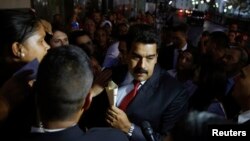CARACAS —
Venezuela's government formally invited Vatican No. 2 Cardinal Pietro Parolin on Wednesday to mediate talks with the opposition in hopes of stemming violence that has killed dozens in the nation's worst unrest in a decade.
In a letter, President Nicolas Maduro's government asked that Parolin, a former envoy to Venezuela who is now the Vatican's secretary of state, be named a “good faith witness” to a dialog agreed after two months of protests.
A Vatican spokesman confirmed the Roman Catholic Church's willingness to mediate, but gave no details.
Venezuela's opposition coalition had indicated that current Vatican envoy, Aldo Giordano, would be attending the first formal talks, which are to start on Thursday in Caracas.
Both Vatican officials are Italian.
Parolin, who represented the Vatican in Venezuela from 2009 to 2013, is a frugal, publicity-shy career diplomat.
The Vatican has helped mediate before in Latin America, including in a territorial dispute between Argentina and Chile in 1978 and a hostage standoff in Peru in 1996-1997.
Venezuela's government and the Democratic Unity opposition coalition held a first preliminary meeting on Tuesday, agreeing to start a formal dialog over issues ranging from crime and economic problems to the detention of dozens of protesters.
Capriles to attend
Henrique Capriles, the opposition's two-time presidential candidate who narrowly lost to Maduro in a vote last year, confirmed he would take part in the discussions.
“I will go to defend the truth,” he told reporters. “Debate doesn't mean our people stop protesting. Quite the opposite. Peaceful protest must continue because the problems continue.”
Hardline demonstrators, however, are not happy about the talks and say there should be no negotiations while another opposition leader, Leopoldo Lopez, and others remain in prison.
Protesters took to the streets in early February, with some openly seeking to provoke a “Venezuelan Spring” that would force Maduro out of power. There have been daily clashes since then as security forces and pro-government militants have faced off with hooded opposition demonstrators blocking streets.
With the armed forces apparently still behind him, and the opposition failing to bring out the millions they had hoped for, Maduro's position does not appear to be under threat.
He does, however, face a big challenge to remedy the roots of the crisis, including the highest inflation in the Americas, shortages of basic goods, a beleaguered private sector, and a violent crime rate that is among the world's worst.
Hundreds of people have been injured and arrested since the protests started. The dead, who number 39 according to the government, include Maduro supporters, opponents, and members of the security force.
Maduro, a 51-year-old former bus driver, has made preserving predecessor Hugo Chavez's socialist legacy the guiding principle of his government. Opponents say he is wrecking Venezuela by sticking to a failed and authoritarian model.
In a letter, President Nicolas Maduro's government asked that Parolin, a former envoy to Venezuela who is now the Vatican's secretary of state, be named a “good faith witness” to a dialog agreed after two months of protests.
A Vatican spokesman confirmed the Roman Catholic Church's willingness to mediate, but gave no details.
Venezuela's opposition coalition had indicated that current Vatican envoy, Aldo Giordano, would be attending the first formal talks, which are to start on Thursday in Caracas.
Both Vatican officials are Italian.
Parolin, who represented the Vatican in Venezuela from 2009 to 2013, is a frugal, publicity-shy career diplomat.
The Vatican has helped mediate before in Latin America, including in a territorial dispute between Argentina and Chile in 1978 and a hostage standoff in Peru in 1996-1997.
Venezuela's government and the Democratic Unity opposition coalition held a first preliminary meeting on Tuesday, agreeing to start a formal dialog over issues ranging from crime and economic problems to the detention of dozens of protesters.
Capriles to attend
Henrique Capriles, the opposition's two-time presidential candidate who narrowly lost to Maduro in a vote last year, confirmed he would take part in the discussions.
“I will go to defend the truth,” he told reporters. “Debate doesn't mean our people stop protesting. Quite the opposite. Peaceful protest must continue because the problems continue.”
Hardline demonstrators, however, are not happy about the talks and say there should be no negotiations while another opposition leader, Leopoldo Lopez, and others remain in prison.
Protesters took to the streets in early February, with some openly seeking to provoke a “Venezuelan Spring” that would force Maduro out of power. There have been daily clashes since then as security forces and pro-government militants have faced off with hooded opposition demonstrators blocking streets.
With the armed forces apparently still behind him, and the opposition failing to bring out the millions they had hoped for, Maduro's position does not appear to be under threat.
He does, however, face a big challenge to remedy the roots of the crisis, including the highest inflation in the Americas, shortages of basic goods, a beleaguered private sector, and a violent crime rate that is among the world's worst.
Hundreds of people have been injured and arrested since the protests started. The dead, who number 39 according to the government, include Maduro supporters, opponents, and members of the security force.
Maduro, a 51-year-old former bus driver, has made preserving predecessor Hugo Chavez's socialist legacy the guiding principle of his government. Opponents say he is wrecking Venezuela by sticking to a failed and authoritarian model.





